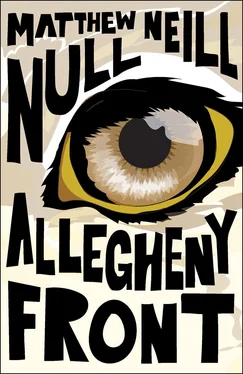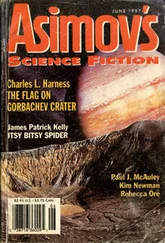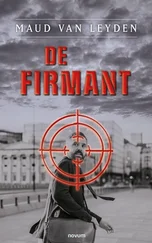He took another little drink. Bottle-flies turned their emerald backs in the sun. Young monarchs gathered to tongue the green horseshit and clap their wings.
Before the Company hired him, Cartwright had sold funeral insurance, apprenticed himself to a farrier, and, in his youth, worked his father’s acres. To hear his father tell it, Anthem was a profane place, and the family would do well to keep ground between their children and such ways. But a month after she buried her husband, Cartwright’s mother closed the deed on their land and moved them to Anthem without debate. Her sister lived by the railroad depot.
Though it had been years since he’d swung a scythe or sheathed his arms in the hot blood of stock, Cartwright’s boyhood helped him build a quick rapport, or so he said, with the farmers who bought his wares. Truthfully, he bullied them into buying the tools, or, if they would not be bullied, he casually insulted the farmers’ methods in front of their wives. “That’s one way of doing things,” he said to the hard sells. “Gets it done sure as any other. Yessir. Hard labor! Of course, you don’t see many men doing it that way anymore. Last season, I found blue-gums down in Greenbrier County working like that.”
“You don’t say.”
“No, excuse me. Season before last. And they might have been Melungeons. Ma’am, could you spare some water for a wayfaring traveler?”
Cartwright would bid them good night and retreat to the hayloft, and, as often as not, be greeted in the morning by the farmer with a fistful of wrinkled dollars and watery, red-rimmed eyes, having been flayed the night long for stubborn habits that clashed with the progressive spirit of the times.
Like his own father, the people Cartwright sold to worked rocky mountain acres, wresting little more than subsistence from the ground. None had owned slaves. Some abstained from the practice out of moral doctrine; most abstained for lack of money. They carded their own wool, cured their own tobacco, and died young or back-bent, withered and brown as ginseng roots twisted from the soil. A handful of affluent farmers in the river bottoms owned early Ford tractors, odd and exoskeletal; the rest still worked mules and single-footed plows. Cartwright had seen acres of corn on hillsides canting more than forty-five degrees.
To even the humblest farmers, still he managed to sell a few harrow teeth or ax-heads.
Success ensnared him: the more he found, the more desolate the places the Company sent him to, and the higher the profits they came to expect. He was the rare man to wring dollars from these scanty places, and he’d grown tired of the counties they cast him farther and farther into like a bass plug. A man couldn’t even buy a fresh newspaper where he roamed. Cartwright brought these people the first word of laws and statutes that a young state government was trying to filigree over the backcountry. He should have said no, but the Company representative appealed to his vanity: “I’ll be straight with you. We’re in the middle of a recession and”—the man was a veteran of the Spanish War—“we need our best on the ramparts. We know you can make quota, buddy. You done proved yourself.” The praise flooded Cartwright’s belly with a singing warmth, sure as a shot of clean bourbon. Only now did he realize the Company had taken advantage of his loyalty. As soon as he hit Anthem, he’d demand a promotion.
Cartwright took the last hit of whiskey and licked his lips. “My ass hurts,” he told the horses through a sly, sidelong grin. “Do your feet hurt? Huh now?”
Now there was the trouble of the last plow; never had he returned with inventory, and he wasn’t about to start. Had to make quota. Cartwright lobbed the jar into a roadside holly bush, where it left a quivering hole in the leaves. “Hup,” he said, slapping the horses’ haunches with the reins. The sweat went flying. A swarm of insects gathered to sup at the horses’ soft eyes, nostrils, assholes. He began to doze, but a furry gray deerfly tagged him on the neck. He slapped it away and cursed softly, so not to spook the horses. Blood formed, round and perfect as a one-carat ruby. Again, he lifted his tie.
McBride seemed to be getting up a small orchard of thorny apples along the road. The split rails of the fence became fresher till they gave out — around the bend, Cartwright found two boys planing and setting lengths of locust by the roadside. Fresh from the adze, the cut lumber gleamed silver in the sun, if marred in places by heartshakes and spalting. The boys wore a coarse homespun, bearing the scurvy look of those who live without women. Their long hair was cut severely, as if it had been chopped with a mattock.
Over the chip-chop-thunk of the adze, the twins spoke to each other in a fluttering brogue, the voice of orioles. They saw the wagon and fell dumb, tools gone limp in their hands. They openly stared. Cartwright reined his horses and said, “Hello there, fellows. You the men of the place?”
While one answered, the other spat on the blade of the scrub plane and ran it grating over a stone. The boy said, “English barn a quarter mile up. Ought to find him there. You a preacher?”
“No.”
“Ah. That’s too bad. We haven’t heard good preaching in a while.” Cartwright wouldn’t have guessed it, but both of the boys could cipher well. The eldest had read the family Bible seven times through. The one on the left asked, “You play music?”
“No.”
“Not the taxman, are you?”
“I’m a salesman.”
The boy had no comment for this. Waving Cartwright on, he opened a mouthful of teeth so black and broken they looked serrated. He stuffed tobacco inside. Cartwright thanked both boys and slapped his horses forward. The wagon went rattling on.
When the drummer was out of earshot, one asked, “What do you think?”
“I expect he’ll expect us to feed him dinner.”
His brother sighted down the scrub plane, eyeing it for flaws. “Need that like a hot nail in the foot.”
“Least he’s not here for taxes.”
“At least.”
The twins turned away, shouldered a rail in tandem, set it atop another.
Catholic Irish, Cartwright thought, like his mother’s father, who’d been converted to the Southern Methodist Church when the preacher said how the Pope’s Catholics was little better than cannibals, eating up the body of Christ and carving the thumbs off of saints. The body is profane, the spirit real! As a boy, he had heard a Catholic in an infirmary pray to beads. They had come here to dig railroad tunnels, but, like exotic flowers, never quite took to the place and died about as quickly as the land would have them.
Soon he came upon a sharp-shouldered man plowing up earth with acres to go. The farmer’s face was sallow and long-whiskered under a broad-brimmed felt hat, but his hands and arms were the color of leaf tobacco. His boots had been mended with baling twine. McBride, for sure. He whoa’d the mule to a stop. The animal was stout and gleamed wetly in the sun, like a doused ingot of iron. Waves of salt had dried on its shoulders.
“Hi,” the drummer said, lifting a hand from the reins. “Good-looking animal you got there.”
“Ought to be,” McBride said. He took off his crushed felt hat and swept it across his forehead like a bandanna. “We paid big on him at the auction. My last mule lived to be thirty-two years old. Hell, my neighbor just give him to me on trade and we worked him swaybacked. After the war, it was. Know how much the price on a mule goes up in thirty-two years?”
Cartwright wanted to say, It’s called capital, old buddy. Instead, he politely inquired as to what the years could do to the price of a mule.
“Enough to take a belt of the good stuff before raising my bidding hand.”
Читать дальше












